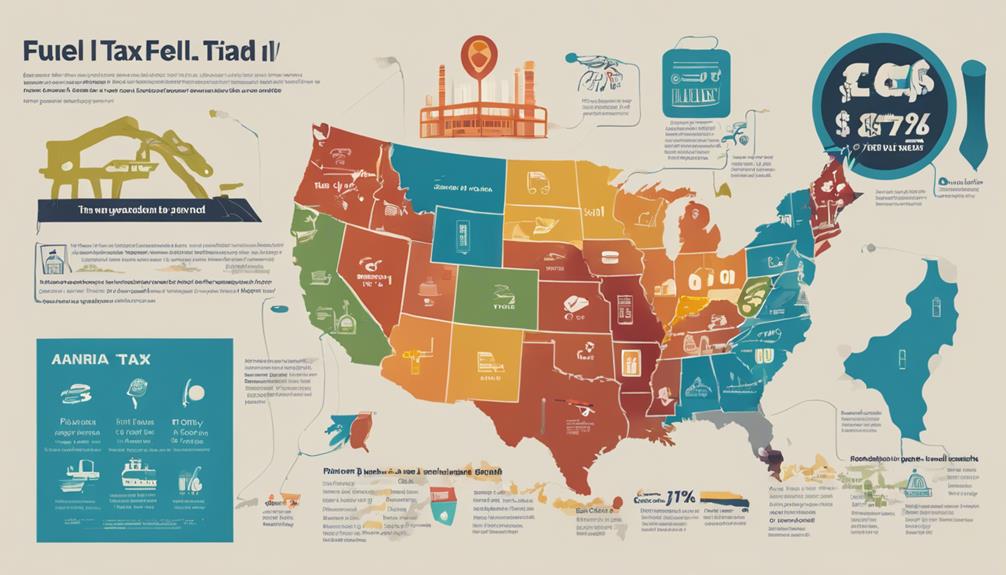If you're involved in the importation of fuels in Virginia, understanding the Virginia Fuels Tax and the necessity of a Bonded Importer Bond is crucial. This bond not only acts as a safety net for the state but also signals your reliability as a business. You might wonder how this bond affects your operations and what steps you need to take to secure it. The implications of failing to comply can be significant, so it's worth considering what the process entails and how you can navigate it effectively.
Overview of Virginia Fuels Tax

In recent years, Virginia's fuels tax has become a crucial source of revenue for maintaining and improving the state's transportation infrastructure. This tax applies to gasoline, diesel, and other motor fuels, serving as a vital funding mechanism for road repairs, public transit, and safety initiatives. When you fill up your vehicle, a portion of the price you pay goes directly into this fund, supporting projects that benefit all drivers.
The fuels tax is typically calculated based on the price of fuel, which means it can fluctuate with market conditions. You might notice changes in the tax amount from one fill-up to the next, depending on the current fuel prices. This system ensures that as fuel costs rise, the revenue for infrastructure improvements can also increase, helping to keep Virginia's roads and bridges safe and well-maintained.
Moreover, the fuels tax plays a significant role in reducing congestion and enhancing the overall efficiency of transportation in the state. By funding essential projects, it directly impacts your daily commute and travel experiences, making it an important element of Virginia's economic and social landscape.
What Is a Bonded Importer Bond?
A bonded importer bond is a legal agreement that ensures compliance with tax regulations for businesses importing fuels and other taxable goods. When you obtain this bond, you're essentially promising to follow all applicable laws and pay any taxes owed on the products you import. This bond acts as a financial guarantee to the government, assuring them that you'll meet your tax obligations.
If you fail to comply with these regulations, your bond can be forfeited to cover the unpaid taxes or penalties. This is why it's crucial for you to understand the requirements and responsibilities associated with being a bonded importer.
To obtain a bonded importer bond, you'll need to apply through a surety company, which will assess your financial standing and business practices. Once approved, you'll pay a premium for the bond, typically a percentage of the total bond amount.
Keep in mind that maintaining a good relationship with your surety is essential. If your bond is ever called upon, it could affect your ability to secure future bonds.
Being informed and compliant helps protect your business and keeps your operations running smoothly.
Importance of the Bond

Understanding the importance of the Virginia Fuels Tax Bond can significantly impact your business operations. This bond serves as a safeguard, ensuring compliance with state fuel tax regulations. By securing this bond, you're demonstrating your commitment to fulfilling tax obligations, which can help you avoid heavy penalties or legal issues.
Additionally, fuel tax bonds provide financial guarantees for tax payments, ensuring that businesses operate legally within state regulations and support government revenue for transportation infrastructure, which is crucial for a stable business environment in the fuel industry fuel tax bonds.
When you operate as a bonded importer, the bond acts as a financial guarantee for the state. It assures them that you'll pay the required taxes on the fuels you import. If you fail to comply, the state can claim against the bond to recover any unpaid taxes. This not only protects the state's revenue but also enhances your credibility as a responsible business owner.
Moreover, having a Virginia Fuels Tax Bond can give you a competitive edge. Clients and partners often view this bond as a sign of reliability and professionalism. They're more likely to trust a business that adheres to regulatory requirements.
Eligibility Requirements
When applying for a Virginia Fuels Tax Bond, you'll need to meet specific eligibility requirements that demonstrate your business's reliability and financial stability.
First, your business must be registered in Virginia and hold the necessary licenses to operate as a bonded importer. This means you'll need to show that you're compliant with both state and federal regulations related to fuel taxation.
Additionally, you'll want to maintain a strong credit history. Lenders often review your credit score to assess your financial responsibility. A higher score can make it easier for you to secure the bond you need. If your credit history isn't stellar, you may still qualify, but you might face higher premiums.
You should also be prepared to provide financial statements or documentation that reflects your business's current financial health. This can include bank statements, profit and loss statements, and tax returns.
Lastly, keep in mind that the bonding company will evaluate your business's experience in the industry. A proven track record of compliance and successful operations can significantly enhance your chances of being approved for the Virginia Fuels Tax Bond.
Application Process

After confirming your eligibility, the next step is to navigate the application process for the Virginia Fuels Tax Bond.
Start by gathering the necessary documentation, which may include proof of your business's identity, financial statements, and any relevant licenses. This information helps your surety company evaluate your application.
Once you have your documents ready, reach out to a surety bond provider. They'll guide you through their specific application form, which typically requires details about your business and its operations.
Be honest and thorough in your responses to avoid delays.
After submitting your application, the surety company will assess your financial stability and creditworthiness. This step is crucial, as it influences the bond amount and terms.
Be patient during this review process, as it may take some time.
If approved, you'll receive a bond agreement outlining the terms.
Make sure to read it carefully before signing. Once you sign, the surety company will issue the bond, allowing you to comply with Virginia's fuels tax requirements.
After that, you're ready to operate with the necessary assurance in place.
Costs and Fees
Navigating the costs and fees associated with the Virginia Fuels Tax Bond can feel overwhelming, but breaking it down makes it manageable.
First, you'll encounter the premium for the bond itself, which typically ranges from 1% to 15% of the bond amount. This percentage depends on several factors, including your credit score and financial stability. If you have a strong credit history, you can expect to pay less.
Next, consider any application fees that your surety company might charge. These can vary but generally fall between $50 to $100.
Be sure to inquire about any additional fees, such as those for document preparation or annual renewals, as these can add up over time.
You'll also want to keep in mind the potential costs of maintaining compliance with the Virginia Fuels Tax regulations. Staying compliant may require ongoing fees for record-keeping or audits.
Consequences of Non-Compliance

Failure to comply with Virginia Fuels Tax regulations can lead to serious repercussions. If you don't follow the rules, you could face hefty fines and penalties that add up quickly. The state takes these violations seriously, and you might find yourself in a legal battle that drains your resources and time.
Additionally, you risk losing your bonded importer status, which can severely impact your business operations. Without this status, you won't be able to import fuels, limiting your ability to serve your customers and potentially driving them to competitors.
Your reputation also takes a hit. Non-compliance can lead to increased scrutiny from regulatory bodies, making future interactions more challenging. Customers might hesitate to trust a business with a history of violations, harming your brand image in the long run.
Lastly, the financial strain doesn't stop at fines. If you're caught evading taxes, you'll also be responsible for back taxes owed, along with interest and additional penalties.
To safeguard your business and maintain your standing in the industry, it's crucial to stay informed and compliant with all Virginia Fuels Tax regulations.
Conclusion
In summary, securing a Bonded Importer Bond is essential for businesses importing fuels into Virginia. It not only ensures compliance with state tax regulations but also boosts your credibility and trustworthiness. By understanding the Virginia Fuels Tax and navigating the application process, you can protect your business from potential penalties. Don't overlook the importance of this bond; it's a vital step in fostering smooth operations and maintaining good standing with both clients and regulatory bodies.


